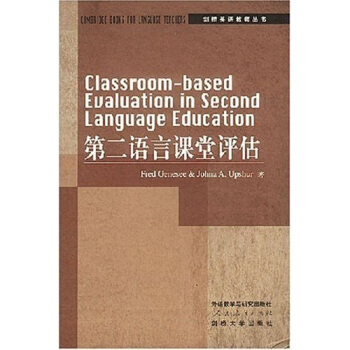

具体描述
内容简介
本丛书精选自剑桥大学出版社为语言教师设计的多套论著和教程,均为当代语言教育领域的力作。由当今国际语言教育界的人士编著并由国内英语教育界专家学者撰写前言或导读。本丛书的20个选题是目前英语教师需要了解的课题。本丛书可作为英语教师继续教育和师范院校英语系的教材,并可供在职大中学教师和语言教育研究者使用。精彩书评
外研社和人教社联合推出这套“剑桥英语教师丛书”,以配合全国中小学英语教师的培训工程。本套丛书的使用者注意两点:一, 这套书不仅仅传播技巧,更重要的是提供思想和方法;不是提供对问题的现成答案,而是告诉你各种理论观点和看法。第二,本套丛书的读者应该努力初步掌握外语教学中的科研方法,学会设计小型的科研项目,学会进行课堂观察,设计问卷,经常写教学日志,会抽样,会收集各种数据,会统计和分析数据等。……
目录
总序List of Illustrations
List of Tables
Series editors preface
Authorsacknowledgments
导读
1.Introduction to evaluation
I GETTING STARTED
2.The context of second language evaluation
3.A framework for evaluation
4.Collecting information
II EVALUATING WITHOUT TESTS
5.Observation in the classroom
6.Portfolios and conferences
7.Journals,questionnaires,and interviews
III EVALUATING WITH TESTS
8.Testing
9.Objectives-referenced testing
10.Choosing and devising test tasks
11.Assembling and scoring tests
12.Interpreting test scores
13.Standardizde tests
14.Summary and integration
Index
精彩书摘
On the basis of their observations, teachers assess what students have and have not learned; they infer the learning strategies students may be using that are facilitating or:impeding learning; they assess the effective-ness of particuiar teaching strategies; they determine which instructional activities and materials the students enjoy; and so on. Information derived from such observations is fundamental to the day-to-day functioning ofthe classroom because it provides a basis for understanding what is happening and for making decisions about what should follow. For example, based on a number of observations, a teacher may judge that a particular student has not learned what was being taught in class that week, whereas the other students have. Alternatively, the teacher may judge that quite a few stu- dents have not leamed the target structure. The observation that only one student has failed to learn a target structure will lead to very different decisions by the teacher than the observation that most ofthe students have not learned it.Teachers also seek to understand how their students are learning and, in particular, to explain those instances when learning does not occur as planned. Their explanations of these situations can be used to plan instruc-tion that will promote learning. In seeking to explain failure to learn, teachers use observation to make inferences about instructional or learning processes or strategies. Observation of student behavior when a particular unit is taught might lead the teacher to infer that t:he students were using strategies that might be effectiVe in their first language but lead to mistakes in the second language. For example, the students may use discourse pat-terns from their first language that are inappropriate in.the second lan-guage. Or the teacher may infer that the students did not find the mate-rials and activities interesting and, therefore, they were not motivated to learn. Teachers' observations of themselves may lead them to infer that they are using instructional strategies that are not working: perhaps they had not been very clear when explaining an assignment or they did not model a new grammatical pattem sufficiently before having the students try using it.
Inferences concerning learning and teaching processes are much more difficult to make than inferences concerning learning outcomes, yet they are equally important for effective teaching. Inferences about language learning outcomes can be made on the basis of observations of concrete instances of the students' actual language use. For example, does the stu-dent use the past tense correctly and appropriately when speaking and/or writing? In comparison, infer.ences about processes related to teaching and learning are based on observations of a wider range ofbehaviors and events and their interrelationships. For example, a teacher's understanding of stu-dent errors when writing and what to do about them might follow from observations directed at answering the following kinds of questions: What kinds of errors do the students make? Can their mistakes be traced to a particular source, such as the first language?. Do they tend to make certain errors under some circumstances more than others? Do they avoid the use of certain structures or communicative functions altogether? It is evident from-this single example that it is not the observation of discrete instances oflanguage use that provides evidence about learning processes; rather, it is the observation of categories of events (such as errors) or fairly complex interrelationships among events (for example, the linguistic or communica-tive contexts within which errors tend to occur more frequently) that are the bases for inferences about learning processes. The same can be said about processes related to teaching.
Inferences about learning and instructional processes are important be-cause they affect significantly the ways in which teachers respond to their students. For example, the inference that students are using strategies derived from the first language when using their second language might lead the teacher to explain to the students the difference between the first and second language with regard to the grammatical structure or com- municative function in question. Of course, this would work only if the students were old enough and had acquired sufficient linguistic sophistica-tion to understand such an explanation. In comparison, the inference that the teacher did not provide ample demonstration of a particular linguistic structure or communicative function might lead the teacher to provide more time for practice using it in whole group activities.
Classroom observation and any associated inferences about teaching and learning are important for planning instruction of the same unit, lesson, or course in the future. Observation of how particular units worked with the current group of students may lead to decisions to retain, drop, or modify them with future groups of learners. Units may be dropped because they were too easy, too difficult, uninteresting, or not useful. Certain units may be modified because observation of their effectiveness with the current students suggested deficiencies or areas for improvement. Observations that a course did not work effectively in general with the current students might lead to decisions to revise the way in which students are placed in the course to ensure greater compatibility between the course and the charac-ter istics of the learners in the course.
……
用户评价
这本书的篇幅令人敬畏,这通常意味着作者对某一领域进行了百科全书式的梳理。我特别关注的是,在当前的教育改革浪潮下,评估体系如何与“核心素养”的培养目标真正对接起来。我们都在强调批判性思维、沟通协作等高阶能力,但如何用可靠、有效的方式去评估这些抽象的能力,一直是困扰一线教师的难题。如果这本书能提供关于“基于表现的评估”(Performance-Based Assessment)的深度解析,特别是如何设计那些能够有效“锚定”这些核心素养的评价量规(Rubrics),那将是极大的贡献。我期望看到的是,它能提供一套超越传统知识点考核的评估范式,比如如何评估学生在真实项目中的问题解决能力、如何在小组讨论中评估其协作贡献度。此外,关于评估的伦理问题,比如如何确保评估过程的公平性、如何处理评估数据以保护学生隐私等方面,如果能有深入的讨论,那就更符合当代教育对专业性的要求了。总而言之,我希望这本书能为我提供一套超越分数线的、面向未来的、促进深度学习的评估哲学和实践路径。
评分我刚开始阅读这本书时,最先被吸引的是其引言部分对评估在二语习得中核心地位的重新界定。作者似乎没有满足于传统的“测量与评价”,而是将其提升到了“促进学习”和“构建学习共同体”的高度。这种理念上的转变对我触动很大。我一直觉得,我们目前的评估体系过于关注“结果展示”,而忽略了评估过程本身对学生元认知能力和学习动机的塑造作用。这本书如果能深入探讨如何设计那些能让学生“乐于接受反馈”并“主动调整学习策略”的评估任务,那将是革命性的。我尤其想知道它对“数字工具赋能下的真实性评估”有什么新的见解。现在很多学校都在推行技术融入教学,但评估环节往往成了应付检查的形式,鲜有高质量的应用。这本书会不会介绍一些前沿的、利用AI或其他平台进行即时、个性化反馈的评估模型?我期望它能提供一种更具人文关怀的评估视角,让评估不再是冰冷的数据采集,而是成为师生间、生生间深度互动的桥梁。如果书中能配有图示化的流程图,指导教师如何一步步构建起一个内嵌了反馈循环的评估体系,那对实践者来说简直是福音。
评分从目录来看,这本书的理论深度似乎不浅,但作为一名多年在国际学校任教的教师,我更关心的是其跨文化适应性和实用性。我们面对的学生群体背景极其多元,他们的学习动机、语言基线和对“评估”本身的理解都存在巨大差异。我迫切希望这本书能提供一些灵活的、可操作的框架,指导我们在面对不同学习者需求时,如何进行评估的“情境化调整”。例如,如何设计一个能同时适应高阶和初级学习者的写作任务,并提供具有区分度的反馈?以往读到的许多评估著作,往往聚焦于某一特定的学习阶段或某一单一的评估模式,缺乏这种宏观的、包容性的视角。如果这本书能提供一个“评估策略矩阵”,清晰地标明在何种教学目标下,应采用何种评估工具,并附带调整参数(如文化适应性、难度系数),那对于我们这种需要频繁跨级别授课的教师来说,简直是救命稻草。我尤其看重书中关于“形成性评估的有效干预点”的探讨,希望它能超越“发现错误”的层面,真正教会我们如何“利用错误”来推动教学的下一步。
评分这本书的排版和装帧给人的第一印象是极其严谨,那种教科书式的布局,每一个图表、每一个脚注都透露出严谨的治学态度。作为一名长期从事英语教师培训的教研员,我接触过的评估类书籍不少,但真正能让人读完后立刻想在接下来的培训课上引用的却很少。我特别关注的是它如何处理“高风险评估”与“日常课堂评估”之间的平衡与衔接问题。在我们的培训体系中,很多老师对“评估”的理解存在严重的二元对立思维,认为只有考试才是评估,而日常的提问和小组活动只是教学环节。我希望这本书能提供一个统一的框架,将两者有机地整合起来,让教师们认识到评估是一个连续的、全方位的过程。另外,对于非英语母语学习者(EFL/ESL)的特殊性,这本书有没有深入讨论如何规避文化偏见和语言背景对评估结果的干扰?比如,在口语测试中,如何区分是语言能力不足导致的失误,还是文化交际习惯差异导致的表达不当?如果能提供一些跨文化敏感性的评估工具设计原则,那这本书的学术价值和社会价值都会大大提升。我个人对其中关于“教师自我评估”的部分非常感兴趣,因为教师自身的评估素养直接决定了他们能给予学生的评估质量。
评分这部厚重的书籍,拿到手上就有一种沉甸甸的学术气息,封面设计简约而不失专业感,那种略带磨砂质感的纸张,让人忍不住想立刻翻开一探究竟。我之所以会关注到它,主要是因为我目前在中小学英语教学一线工作,深感当前我们对于“评估”这件事的理解还停留在比较表层的分数和等级上,缺乏一种更具发展性和诊断性的视角。我期待它能提供一些真正落到实处的教学策略,而不是空泛的理论堆砌。翻开目录,那些关于形成性评估、差异化反馈机制、以及如何将技术融入课堂评估的章节标题,一下子就抓住了我的眼球。特别是有提到“基于任务的评估设计”,这正是我最近在教研组里热烈讨论的难题。我希望这本书能给我指明方向,告诉我如何设计出既能真实反映学生语言运用能力,又不会给老师增加过多负担的评估工具。如果它能提供一些具体的案例研究,展示不同文化背景和不同年龄段学习者的评估实践,那对我来说价值就更大了。我一直认为,好的评估应该是教学的“指南针”,而不是“审判官”,这本书的厚度似乎预示着它在这方面会有深入的探讨。我最近正在尝试减少期末考试的权重,转而采用更多的过程性评估,所以,我非常期待书中能提供一些关于如何说服家长和行政部门接受这种转变的实战经验和数据支持。
评分书是正品,包装也很好,送货速度也很快,书封面有轻微折痕,不影响。
评分公司同事购买,配送速度快
评分书是正品,包装也很好,送货速度也很快,书封面有轻微折痕,不影响。
评分看过类似这类的书很多,没有一下子被吸引.
评分包装不错~此次买了6本,此本待看~ 能派到用处 吃完午饭,趁手头工作不多,便给朋友发了条短信,这次等了半个小时,却依旧没有朋友的回信。我开始坐立不安,记得不久的过去,就算她忙,她总会在半小时内回他的呀!他怀疑难道是自己昨天没发短信给她她生气了?两小时后信息回来,告诉我要到京东帮他买书,如果不买或者两天收不到书就分手!,我靠,没有办法,我就来京东买书了。没有想到书到得真快。书不错 还送光碟 就是快递不给力 太慢了 但还行 好期待的书 可来了在我还没有看这本书的时候,我丝毫不怀疑它是一本好书,很符合80后读者的口味。很难想象一本图书会被我看得像郭德纲的相声书一样,在地铁上都如饥似渴地手不释卷。人都说《红楼梦》是一部罕见的奇书,是人生的镜子,那么对于这部书,在某种意义上也令我感到了丝丝“找出心中所想”的意味,因为我不仅从中看出大论的味道,更是以一种看搞笑图书的心情在愉悦自己,事实上这本书确实不失幽默,在大论了一把之后确实愉悦了广大读者,在此之前,我从来没想过会像一本幽默小说一样去看这本书,因为多年来这类书的泛滥使我对其十分不屑。京东商城图书频道提供丰富的图书产品,种类包括小说、文学、传记、艺术、少儿、经济、管理、生活等图书的网上销售,为您提供最佳的购书体验。网购上京东,省钱又放心!在网上购物,动辄就要十多元的运费,往往是令许多网购消费者和商家踌躇于网购及销售的成本。就在买方卖方都在考虑成本的同时,京东做了一个表率性的举动。只要达到某个会员级别,不分品类实行全场免运费。这是一个太摔的举动了,支持京东。给大家介绍本好书《小时代3.0:刺金时代》内容简介《小时代3.0:刺金时代》是郭敬明的第五部长篇小说,于2007年11月开始在《最小说》上独家连载,获得读者们空前热烈的追捧,各大媒体的相关讨论和争议也层出不穷,一场火爆的《小时代3.0:刺金时代》风潮由此掀起。郭敬明在《小时代3.0:刺金时代》的创作中,又一次展现了对多种文字风格的完美驾驭能力。他以全新的叙事风格和敏感而细微的笔触,将当代青少年、大学生、都市白领的生活和情感故事集中、加工、娓娓道来,从小角度展现了作者对整个社会的观察和思考。这部长篇系列正式开始前,郭敬明曾许诺将要连续创作五年,而在五年终结之际,《小时代3.0:刺金时代》系列将如约迎来它辉煌的谢幕。林萧、简溪、顾源、顾里、南湘、唐宛如……五年间,他们已然成为陪伴读者们度过青春时期的伙伴,他们仿佛活生生地站在读者身边,呼吸着,微笑着,与每一个人共同欢乐,共同哭泣。故事有终结的一天,然而人物却能跃出故事,在读者心中长长久久地鲜活下去,从这个意义上来讲,《小时代3.0:刺金时代》是每一个读者的小时代,它永远也不会完结。
评分从远古开始,人们不断丰富自己的知识从油灯到电灯到无影灯,从刀剑到枪械到炸弹,从热气球到飞机到火箭正因人们不断丰富知识,掌握技能,才让人们在自然中生存。我们没有猛犸象的庞大;没有猎豹的速度;没有致命的毒液;没有尖锐的牙齿......是什么让人类得以生存?是知识!枪械让我们训服野兽;飞机让我们在天空中翱翔;船只让我们在海洋中畅游话说诸葛亮草船借
评分,阅读了一下,写得很好,本丛书精选自剑桥大学社为语言教师设计的多套论著和教程,均为当代语言教育领域的力作。由当今国际语言教育界的人士编著并由国内英语教育界专家学者撰写前言或导读。本丛书的20个选题是目前英语教师最需要了解的课题。本丛书可作为英语教师继续教育和师范院校英语系的教材,并可供在职大中学教师和语言教育研究者使用。,外研社和人教社联合推出这套剑桥英语教师丛书,以配合全国中小学英语教师的培训工程。本套丛书的使用者注意两点第一,这套书不仅仅传播技巧,更重要的是提供思想和方法不是提供对问题的现成答案,而是告诉你各种理论观点和看法。第二,本套丛书的读者应该努力初步掌握外语教学中的科研方法,学会设计小型的科研项目,学会进行课堂观察,设计问卷,经常写教学日志,会抽样,会收集各种数据,会统计和分析数据等。,,;:;-;;.--.,,,.,-..,,.-.,.:.,-.-.-,,.:.,..,-?,..,-:?,?.??-;,()(,-)..-.,-.,-.,.,,.,,.,,,..-.。
评分“少年是可忽略不计的流行,青春是稍纵即逝的朝霞!”跨入十八的门槛,我为自己的青春许诺:“
评分"[SM]和描述的一样,好评! 上周周六,闲来无事,上午上了一个上午网,想起好久没买书了,似乎我买书有点上瘾,一段时间不逛书店就周身不爽,难道男人逛书店就象女人逛商场似的上瘾?于是下楼吃了碗面,这段时间非常冷,还下这雨,到书店主要目的是买一大堆书,上次专程去买却被告知缺货,这次应该可以买到了吧。可是到一楼的查询处问,小姐却说昨天刚到的一批又卖完了!晕!为什么不多进点货,于是上京东挑选书。好了,废话不说。好了,我现在来说说这本书的观感吧,一个人重要的是找到自己的腔调,不论说话还是写字。腔调一旦确立,就好比打架有了块趁手的板砖,怎么使怎么顺手,怎么拍怎么有劲,顺带着身体姿态也挥洒自如,打架简直成了舞蹈,兼有了美感和韵味。要论到写字,腔调甚至先于主题,它是一个人特有的形式,或者工具;不这么说,不这么写,就会别扭;工欲善其事,必先利其器,腔调有时候就是“器”,有时候又是“事”,对一篇文章或者一本书来说,器就是事,事就是器。这本书,的确是用他特有的腔调表达了对“腔调”本身的赞美。|发货真是出乎意料的快,昨天下午订的货,第二天一早就收到了,赞一个,书质量很好,正版。独立包装,每一本有购物清单,让人放心。帮人家买的书,周五买的书,周天就收到了,快递很好也很快,包装很完整,跟同学一起买的两本,我们都很喜欢,谢谢!了解京东:2013年3月30日晚间,京东商城正式将原域名360buy更换为jd,并同步推出名为“joy”的吉祥物形象,其首页也进行了一定程度改版。此外,用户在输入jingdong域名后,网页也自动跳转至jd。对于更换域名,京东方面表示,相对于原域名360buy,新切换的域名jd更符合中国用户语言习惯,简洁明了,使全球消费者都可以方便快捷地访问京东。同时,作为“京东”二字的拼音首字母拼写,jd也更易于和京东品牌产生联想,有利于京东品牌形象的传播和提升。京东在进步,京东越做越大。||||好了,现在给大家介绍两本本好书:《谢谢你离开我》是张小娴在《想念》后时隔两年推出的新散文集。从拿到文稿到把它送到读者面前,几个月的时间,欣喜与不舍交杂。这是张小娴最美的散文。美在每个充满灵性的文字,美在细细道来的倾诉话语。美在作者书写时真实饱满的情绪,更美在打动人心的厚重情感。从装祯到设计前所未有的突破,每个精致跳动的文字,不再只是黑白配,而是有了鲜艳的色彩,首次全彩印刷,法国著名唯美派插画大师,亲绘插图。|两年的等待加最美的文字,就是你面前这本最值得期待的新作。《洗脑术:怎样有逻辑地说服他人》全球最高端隐秘的心理学课程,彻底改变你思维逻辑的头脑风暴。白宫智囊团、美国FBI、全球十大上市公司总裁都在秘密学习!当今世界最高明的思想控制与精神绑架,政治、宗教、信仰给我们的终极启示。全球最高端隐秘的心理学课程,一次彻底改变你思维逻辑的头脑风暴。从国家、宗教信仰的层面透析“思维的真相”。白宫智囊团、美国FBI、全球十大上市公司总裁都在秘密学习!《洗脑术:怎样有逻辑地说服他人》涉及心理学、社会学、神经生物学、医学、犯罪学、传播学适用于:读心、攻心、高端谈判、公关危机、企业管理、情感对话……洗脑是所有公司不愿意承认,却是真实存在的公司潜规则。它不仅普遍存在,而且无孔不入。阅读本书,你将获悉:怎样快速说服别人,让人无条件相信你?如何给人完美的第一印象,培养无法抗拒的个人魅力?如何走进他人的大脑,控制他们的思想?怎样引导他人的情绪,并将你的意志灌输给他们?如何构建一种信仰,为别人造梦?[SZ]"
相关图书
本站所有内容均为互联网搜索引擎提供的公开搜索信息,本站不存储任何数据与内容,任何内容与数据均与本站无关,如有需要请联系相关搜索引擎包括但不限于百度,google,bing,sogou 等,本站所有链接都为正版商品购买链接。
© 2026 windowsfront.com All Rights Reserved. 静流书站 版权所有

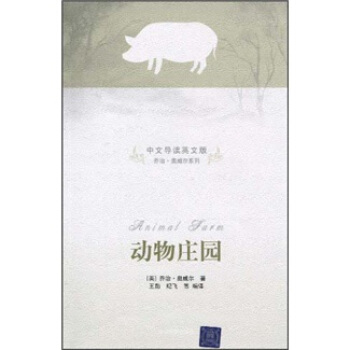
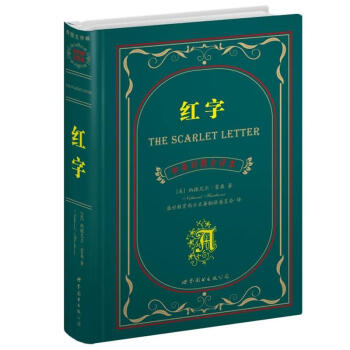
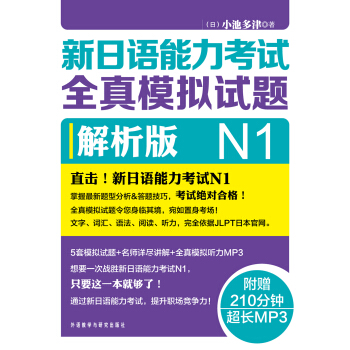
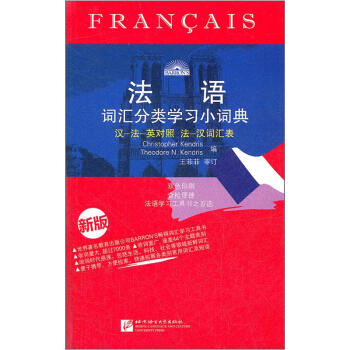
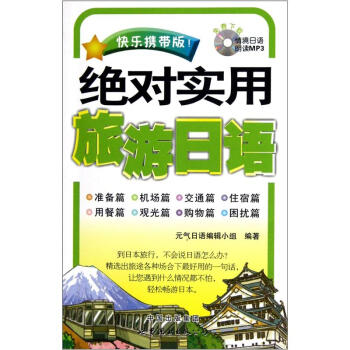
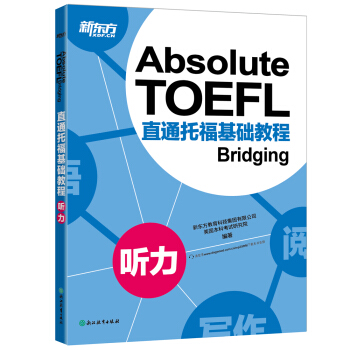



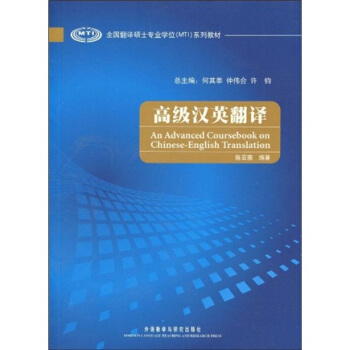
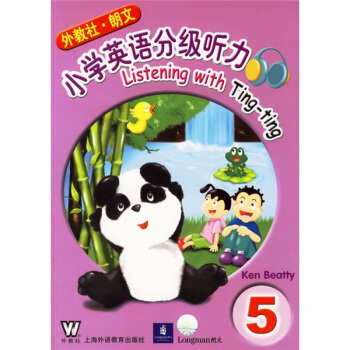
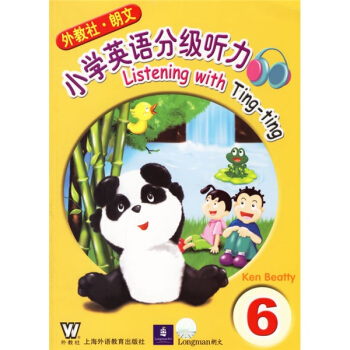
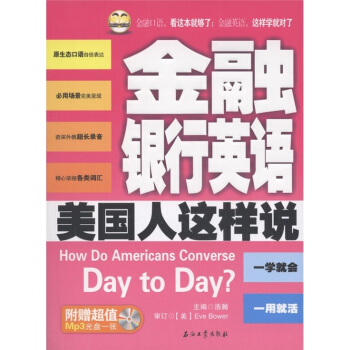
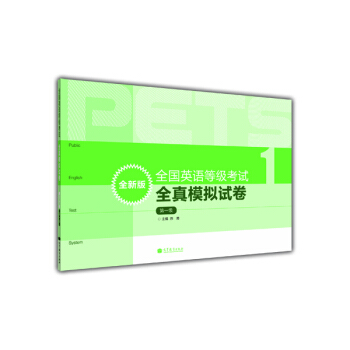


![职场日本语:商务礼仪篇 [しごとの日本語 ビジネスマナー編] pdf epub mobi 电子书 下载](https://pic.windowsfront.com/11615860/5508db6bNa87fdc31.jpg)

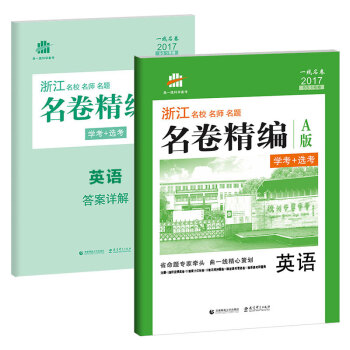
![轻松英语名作欣赏:灰姑娘(小学版)(附光盘1张) [Cinderella] pdf epub mobi 电子书 下载](https://pic.windowsfront.com/10035322/581072e9Ne5521062.jpg)